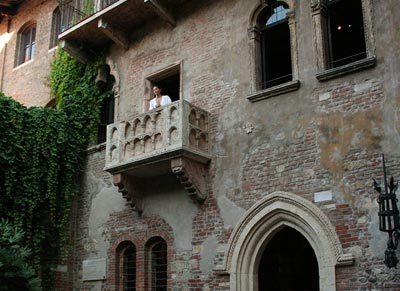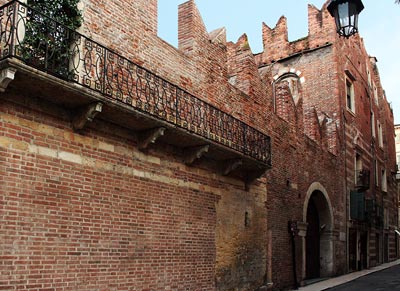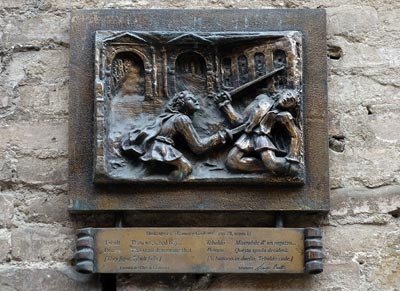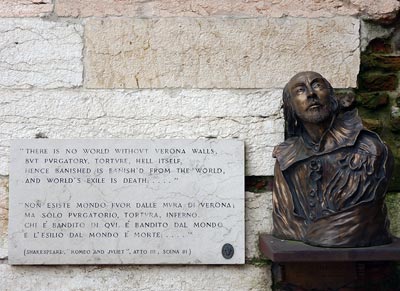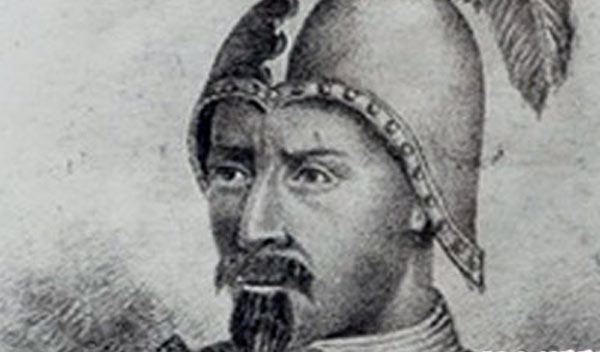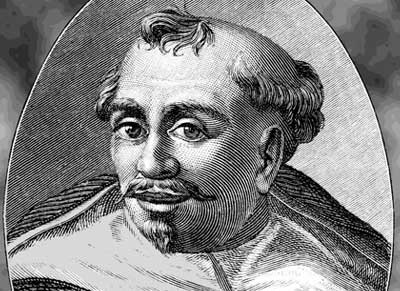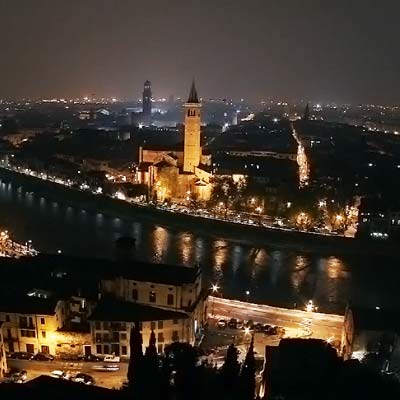Matteo Bandello

Matteo Bandello, after Luigi da Porto, was the second Italian author to write his own version of the story of Romeo and Juliet. The story is contained in his Novelliere published in 1554. And it is precisely this version that Shakespeare, almost thirty years later, copied.
Oncoming Tours
Info & Romeo and Juliet's Tours:
+39 333 2199 645 info@veronissima.com P.I. 03616420232 C.F. CPPMHL74L13L781C
Matteo Bandello was born in Castelnuovo Scrivia, Piedmont, in 1485. As a very young man, he entered the monastery of Santa Maria delle Grazie in Milan as a novice, thanks to the support of his uncle Vincenzo, who was its prior. At that time, Leonardo da Vinci was painting the famous Last Supper there. The young Matteo saw the master at work and in one of his novels gave a vivid description of the way of painting of the great genius.
In spite of his monastic vows, Matteo Bandello had an intense social life. He was secretary and diplomat at the court of the Sforza first and then of the Gonzaga, establishing ties and contacts with important political and literary figures of the time. He fell in love with a lady of the court for whom he wrote poems published in his Rime.
Thanks to his contacts with the king of France, Matteo Bandello became bishop of Agen, a French city, where he lived until his death in 1561.
Literary activity
In addition to his rhymes, collected in a songbook based on the Petrarchan model, Matteo Bandello published also a Novelliere, a series of short stories that represent the multiform human comedy, with themes and style inspired by Boccaccio.
His tales were translated into French, were very successful, and spread throughout Europe, where they became the inspiration for a great many authors of the 1500s and 1600s.
"Twelfth Night" and "Much Ado About Nothing" by William Shakespeare are clearly based on his novellas. Even Cervantes took inspiration from Bandello for his short story "La española inglesa".
The Novella IX
"The piteous death of two ill-fortuned lovers who died, the one of poison and the other of giref, with various circumstances there-unto appertaining."
The novella that interests us most, however, is novella IX of the second book. In this case it is Matteo Bandello who seems to be inspired by the text of Luigi da Porto. The plot is substantially the same.
Want to know more?
Every novella by Matteo Bandello is preceded by a dedication. In this case to Girolamo Fracastoro, a Veronese doctor who was among the first to hypothesize the microbial origin of diseases. The author thanks him for having recommended the water of the sources of Caldiero, a spa town in the east of Verona, to treat his kidney problems. In Caldiero he was in the company of some Veronese nobles who cheered up his days with games and stories. Among these there was Alessandro Pellegrini who made all those present cry with a story with a tragic ending that Matteo Bandello promptly included in his collection.
The novella begins with a wonderful description of Verona that suggests that Matteo Bandello must have known the city very well.
"There be few cities in the fair Italy which excel Verona in goodliness of situation, as well for so noble a river as the Adige, which divideth it well-nigh in half with its most limpid waters and casueth it to abount in the wares which Germany sendeth, as also for the pleasant and fruitful hills and the delightsome valleys and sunny fields which encompass it, not to speak of the many fountains, rich in cool and limpid waters, which serve the commodity of the city, the four most boble bridges over the said river and the thousand venerable antiquities to be seen in place."
In this beautiful Verona, at the time when Bartolomeo della Scala was the lord of the city, there were two families that had been fighting each other for a long time: Montecchi and Capelletti. The equal nobility and wealth had prevented one of the two from prevailing over the other so that the bloody feuds had caused numerous deaths on both sides and in the factions that supported them. Even though Bartolomeo della Scala was not able to pacify them, he was at least able to put an end to the continuous fights that opposed the two families upsetting the city.

It so happened that one year, after Christmas, Verona began to hold masked parties in which the young people of the city participated. Antonio Capelletto, the head of his family, organized a sumptuous party in his palace. Twenty-year-old Romeo Montecchi also participated. With his friends, he enters the Capelletti's house in disguise. Romeo had been in love with a woman for two years, but she did not give him the time of day, despite the many letters and embassies he had sent her. In order to forget his disdainful beloved, poor Romeo had thought of leaving Verona and travelling around Italy for a few years to forget her, but he had not yet decided to leave. His friends tried to console him by telling him that he was wasting his love for a woman who did not deserve him. So they took part in the various fancy dress parties held in Verona, without giving a glance to their beloved, looking for a woman who, pleasing him, could replace the one he longed for in his heart.
At Messer Capelletti's party, Romeo stands aside to observe the guests and, taking off his mask, he causes the amazement of those present, on the one hand for his beauty and elegance, and on the other for the fact that a Montecchi is in the Capelletti household. But Romeo is a "very costumed and kind young man" and "generally loved by all". The girl in whom Romeo is most interested, however, is the young daughter of Messer Antonio Capelletti, Giulietta, who cannot keep her eyes off him. Romeo is also struck by Juliet's beauty, but the two do not find a way to talk and get to know each other. The opportunity presents itself when the "press" dance begins. Romeo is taken to dance by a woman and, having passed the press to another woman, he goes to stand in the circle formed by the participants in the dance, right next to Juliet and with her hand in hand. Juliet, with the other hand holds messer Marcuccio, "a very pleasant man of the court" but with perpetually cold hands. Juliet rejoices with Romeo to shake his warm hand. When the dance is over, the two reluctantly part, anxious to know more about each other. Juliet, questioning her trusted nurse, thus discovers that Romeo is none other than a member of the rival house.

Romeo, in that first meeting at the party at Capelletti's house has fallen madly in love with Juliet and, more and more frequently, especially in the evening hours, he stops in the alley on which the window of Juliet's room gives, from which, from time to time, he can secretly glimpse her. One evening Juliet opens the window and, looking out, sees Romeo illuminated by the moon. Juliet, amazed, speaks to him and the two confess to each other the love that consumes them. Juliet, however, tells Romeo that they can only meet if they are bound by the sacred bond of marriage. So they decide to get married with the help of Friar Lawrence of Reggio, Juliet's spiritual father and Romeo's friend, "master in theology, great philosopher and expert in many things and admirable and practical distiller of the art of magic". Friar Lawrence agreed to marry the two, hoping to put an end to the enmity between the two houses. With the excuse of going to confession, Juliet goes to the church of Friar Lawrence and there, having removed the grill from the confessional, the religious man brings Romeo and Juliet together and celebrates the marriage. At nightfall, Romeo goes to the Capelletti's palace and, having climbed over the wall, finally meets his beloved Juliet. The two leave each other promising to find a way to inform Juliet's father of their marriage as soon as possible. It is the Easter period, and "on the Corso near the porta dei Borsari towards Castelvecchio", two groups, one of Capelletti, the other of Montecchi, meet giving rise to an armed clash. The most heated in the fray is Tebaldo, Giulietta's cousin. Romeo arrives, and fearing that the rekindling of the feud between the families might compromise his marriage to Juliet, tries to calm the spirits and separate the contenders. Romeo is dragging his men out of the fray when Tybalt strikes him in the side. The armor saves Romeo from the blow, and despite everything he begs Tybalt to lower his weapons and not shed more blood. Tebaldo does not listen to reason and ventures back to Romeo who parries the blow and unintentionally strikes Tebaldo to death. Bartolomeo della Scala, having heard the story of the brawl, is convinced of Romeo's good intentions and instead of condemning him to death, banishes him from Verona. In the Capelletti's house, to the despair for Tebaldo's death, is added Giulietta's despair for Romeo's departure from Verona. Romeo hides in Friar Lawrence's cell and in the evening he manages to meet Juliet in the garden of the Capelletti's house. She begs him to take her away with him; if necessary she will cut her hair and follow him, pretending to be a page. He dissuades her from doing this and promises her that as soon as possible he will find a way to bring her to him. Amidst tears, the two break up. Romeo takes refuge in nearby Mantua. Juliet, who remains in her father's house, cannot rest from the absence of her beloved and spends her days crying, without touching food and without sleeping. Juliet's mother, ignoring the real reasons for her daughter's despair, thinks that the cause of her pains is the secret desire to take a husband, since some of her dear friends have recently married. The Capelletti couple decides to give Juliet in marriage to the Count of Lodrone, a twenty-four year old of important lineage. Juliet naturally refuses, unleashing the fury of her father. It is the day of the Feast of the Assumption and Juliet, with the excuse of confessing, meets Friar Lawrence to tell him of her intention to go to Romeo disguised as a boy. Friar Lawrence tries to dissuade her, but she asks him for poison so that she can die, since she cannot be reunited with Romeo and is now destined to marry Count Lodrone. Understanding Juliet's determination, Friar Lawrence agrees to give her a potion that will make her appear dead. Buried in the family tomb, the following night she will wake up and, helped by the friar, will be able to reunite with Romeo. Juliet accepts. Juliet returns home in a relieved mood and begins, apparently willingly, to complete the preparations for her imminent marriage to the Count of Lodrone. The night before the wedding day arrives and Juliet is about to drink Friar Lawrence's potion. She imagines her awakening in the family tomb, among the bones of her ancestors and the decomposing body of Tybalt, she thinks back to the stories of what happens at night in the cemeteries and, seized by the horror of those visions, she hesitates to drink the friar's powder. Then she thinks of Romeo and, without further ado, she takes a drink.

The following morning, Juliet's nurse goes to wake her up and finds her dead. The desperation, pain and sadness for the loss of the young girl spread to the family and the entire city. The doctors summoned do not know how to explain the sudden death and attribute it to the sadness that had gripped Juliet in that period. The funeral is set for the evening. In the meantime, Friar Lawrence, having written a letter in which he explains everything to Romeo, entrusts it to a friar of his convent and sends him to Mantua. Once in Mantua, the messenger of Friar Lawrence goes to the convent of San Francesco to seek help in the search for the young man from Verona. But that same evening a friar of the Mantuan convent died and the suspicion that it was the plague. The convent is quarantined, no one is allowed in or out and so the friar cannot deliver his letter to Romeo. In the meantime, Pietro, Romeo's trusted servant, learns of Juliet's death and rushes to give the news to his lord. Romeo, shocked by the news, tries to kill himself with his own sword, but Peter prevents him from doing so. When he comes to his senses, Romeo decides he wants to see the face of his beloved once again and agrees with his faithful servant to return to Verona disguised as a German. Before leaving, Romeo writes a letter to his father decreeing his last wishes and telling him what has secretly happened. He takes poison with him. Juliet is laid in the family ark, a "very large ark outside the church over the cemetery, and on one side was attached to a wall that in another cemetery had from three to four arms of walled place". Friar Lawrence makes room between her bones, cleans the inside and lays her head on a soft pillow. Romeo arrives in Verona when it is still night and immediately goes to the church of San Francesco, located outside the walls in the citadel. With Pietro's help, he opens the chapel and enters, fainting from the pain of seeing Juliet dead. Desperate, he drinks the poison, delivers the letter to the servant and orders him to close the sarcophagus. Left alone with Juliet, he embraces her in a sad embrace, melting into tears. Juliet wakes up and after her first astonishment, in which she believes that the person holding her is Friar Lawrence who is taking advantage of her, she recognizes Romeo who, in the joy of seeing her alive, despairs and tells her that he drank the poison. Juliet, distraught, tells him what she had planned with the help of Friar Lawrence. Romeo, seeing Tybalt's body, asks him for forgiveness. He then begs Juliet to live happily for a long time, even without him. Friar Lawrence, not having seen Romeo arrive, goes to Juliet's tomb. Friar Lawrence, having not seen Romeo arrive, goes to Juliet's tomb. Romeo speaks his last words and dies. Desperate Juliet dissolves into tears, saying she feels Romeo's spirit around her and wants to reach him. Friar Lawrence and Peter beg her to leave, there is nothing she can do for her Romeo, Friar Lawrence will have her enter a monastery where she can pray for her husband's soul. Juliet, however, with Romeo's head in her lap, without saying anything, dies. Believing her to have fainted, they go to help her, finding her dead, and are surprised by the gendarmes, who have arrived on the spot because of the commotion. Friar Lorenzo is brought to Bartolomeo della Scala who, after being told what has happened, forgives the friar and decrees that the young people remain buried together, thus pacifying the two families of Montecchi and Capelletti. The following epitaph is engraved on the sarcophagus:
Romeo, believing that his lovely bride
Was dead, his life with water did away
That folk call serpent-water, not a day
After her choosing in the world to bide.
Wheneas she knew the sore chance, weeping-eyed
She turned her to her husband, as be lay
And mourned as most she might his life's decay
Nor spared at heaven and all the stars to chide.
Then, when his life, alack, at end she knew,
More dead than he, "Ah God," uneath she sighed,
"Grant me my dearest husband to ensue,
"So where he goeth I may be abide
With him: for this alone I seek and sue;"
And saying this, for stress of dole she died.
Info & Bookings:
+39 333 2199 645 info@veronissima.com P.I. 03616420232 C.F. CPPMHL74L13L781C

 IT
IT 日本
日本 DE
DE FR
FR 中文
中文 ES
ES
